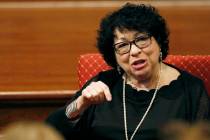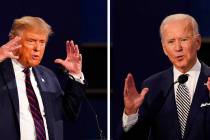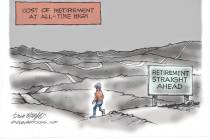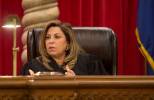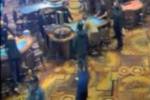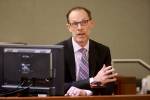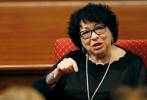Open judicial selection
Since this space is frequently devoted to bemoaning government secrecy and closed-door meetings, I would be remiss, nay, derelict if I failed to offer a tip o' the hat in recognition of the fact the Nevada Commission on Judicial Selection has chosen to throw open its doors and let the public see just how they go about selecting judges to fill mid-term vacancies.
On Tuesday, in front of the public, reporters and cameras, the nine-member commission winnowed a field of eight candidates for the Family Court judgeship being vacated by retiring Judge Gerald Hardcastle to three and forwarded those names to the governor for appointment. It is a process that has taken place for years, but until this past week behind closed doors, inviting the natural suspicions that some collusion or nefariousness might be taking place.
When then-Chief Justice of the state Supreme Court William Maupin announced the change in procedure in December, he said, "The commission believes in the quality of the process and firmly believes the public should see it. One of the most important functions of government involves the selection of judges. This is an experiment in open government we know will succeed."
On Tuesday, now-Chief Justice Mark Gibbons echoed those sentiments as he chaired the day-long open meeting of the commission.
One by one the commissioners grilled the eight applicants, asking hypothetical questions about how they would handle certain legal matters, questioning their ability to maintain control of the courtroom, making inquiries about experience, demeanor, openness, intellect and all the sort of questions one would expect in a job interview. All was in the open except for a very brief session in a back room to consider health or financial information about the candidates.
Justice Gibbons explained that commissioners were in some ways acting like a jury. They'd not previously discussed with each other the candidates and at the end would fill in a secret ballot selecting the top three to send to the governor.
Though the balloting was secret, during the deliberations several commissioners either flat out said who they favored or gave strong hints as to which they felt is more qualified.
Letters submitted to the panel about the candidates were kept confidential so as to assure candor from people who might one day have to appear in front of a judge they'd panned.
At the end of deliberations I had not heard any mention of the candidates' political affiliations or whether they leaned left or right. It was all about qualifications, demeanor, experience.
For example, one commissioner said some judges tend to be afflicted with "black robe fever" but that would never happen with former Chief District Attorney Robert Teuton.
While the session was conducted in a no-nonsense manner and guided firmly and efficiently by Justice Gibbons as chair of the commission, there was a moment in which the openness of the hearing prompted some silent but knowing smiles.
I'd slipped into the chambers as candidate Robert Lueck, a former Family Court judge who was voted out of office in 2004 and lost a bid for another judgeship in 2006, was being questioned. Temporary Commissioner Steve Wolfson, a Las Vegas City Council member and an attorney, asked Lueck why the panel should send his name to the governor when voters had already rejected him twice.
Not realizing I was seated right behind him, Lueck proceeded to blame "negative" news stories and his being "smeared in the press." He specifically mentioned an R-J story in which it was alleged he had taken custody of a child away from a mother because she attended church too often.
At that Justice Gibbons and I exchanged knowing nods as Lueck ranted on about vitriolic people and how women vote for women and how divorce cases should not be public and how a sitting judge paid $5,000 for an endorsement and various violations of judicial ethics.
Of course he did not mention that he was taken off that child custody case by then-District Court Judge Mark Gibbons, nor that his retention rating in the biennial Review-Journal survey of lawyers' opinions of judges had fallen to only 53 percent, nor that Review-Journal had editorially endorsed him.
In the end the top three were named on the first ballot -- Bryce Duckworth, Charles Hoskin and Teuton. Not sure how many votes Lueck got.
So, a tip o' the hat to the Judicial Selection Commission for letting the public see how this particular sausage is made.
Thomas Mitchell is editor of the Review-Journal and writes about the role of the press and access to public information. He may be contacted at 383-0261 or via e-mail at tmitchell@reviewjournal.com.










